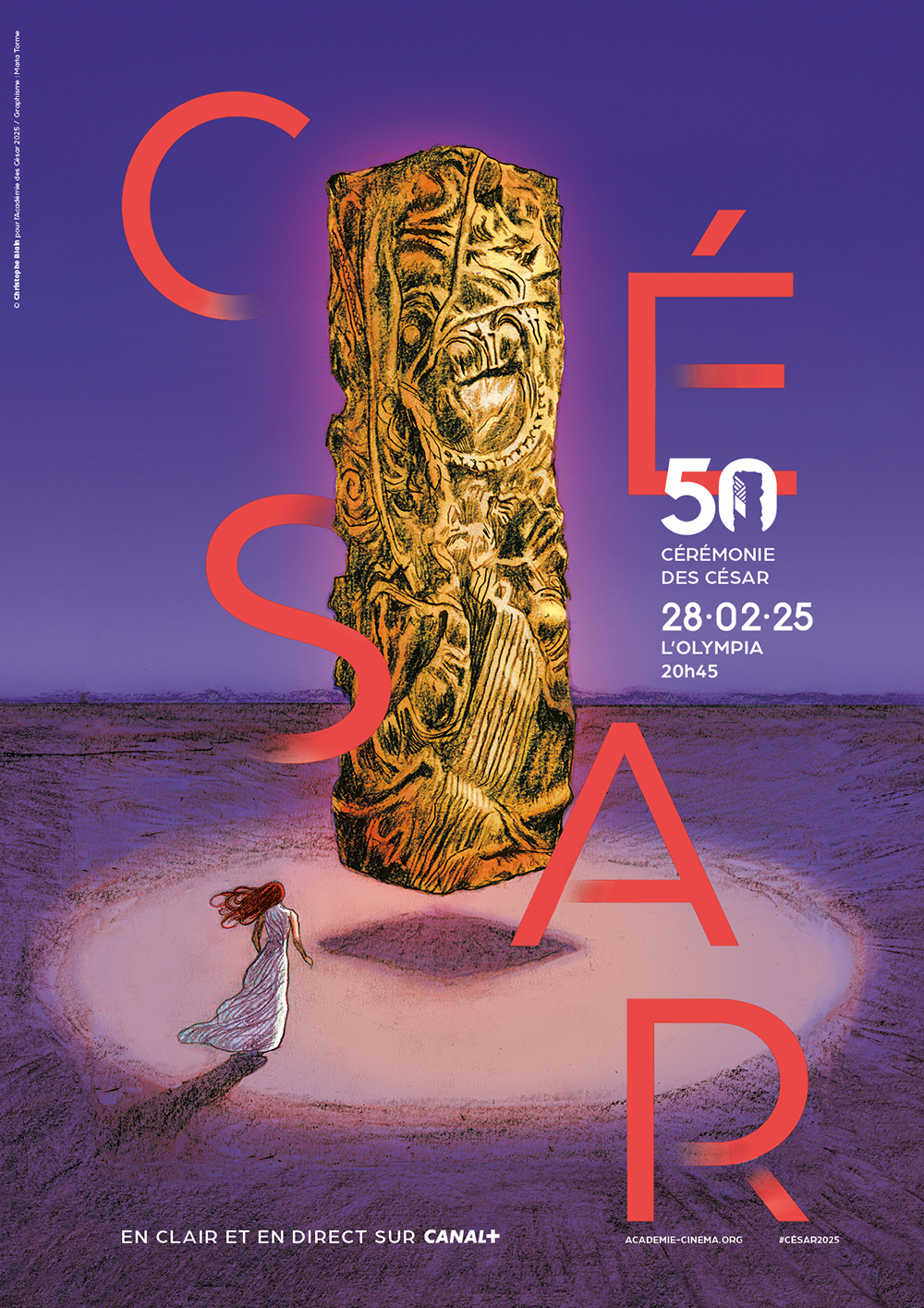Cerermony - César Awards Ceremony: An anniversary edition marked by renewal and emotion
By Mulder, 01 march 2025

The 50th César film awards ceremony was held on February 28, 2025, at the Olympia, in the heart of Paris. Organized by the Académie des arts et techniques du cinéma, this prestigious evening honored the films that made their mark in 2024. For this anniversary edition, the ceremony was presided over by a legend of French cinema: Catherine Deneuve. The staging was provided by the filmmaker Cédric Klapisch, bringing a touch of modernity and humor to this unmissable event.
On January 24, Canal+ announced a collective presentation for the ceremony, an innovative approach that brought together a dozen personalities from the world of cinema. Jean-Pascal Zadi was the main speaker, accompanied by Emmanuelle Béart, Alice Belaïdi, Cécile de France, Hafsia Herzi, Bouli Lanners, William Lebghil, Vincent Macaigne, Pio Marmaï, Vimala Pons, Raphaël Quenard, Ludivine Sagnier and Justine Triet. This unprecedented dynamic breathed a wind of freshness and spontaneity into the evening. The Academy's aim was to break with traditional codes and bring a more accessible and interactive dimension.
Unveiled on January 30, the trailer for the ceremony, directed by Cédric Klapisch and conceived by Mohamed Hamidi, caused a sensation. Designed in the form of a meeting of “Alcoholics Anonymous”, it featured actors and actresses who had never won a César, expressing their frustration. Louise Bourgoin, François Damiens, Franck Dubosc, Vincent Macaigne, Géraldine Nakache and Zinedine Soualem were among them, while Jean-Pascal Zadi tried to reassure them, having already won a César in 2021. The surprise arrival of Cécile de France and Kad Merad, showing off their own trophies and mischievously slipping away, added a much-appreciated touch of self-mockery. This light-hearted and original approach was enthusiastically received by the public and industry professionals.
The evening was marked by several moving tributes. The first segment was dedicated to Alain Delon, followed by a poignant tribute to Michel Blanc. Pomme and Aliocha Schneider performed a song in memory of the year's deceased, including Bertrand Blier, Niels Arestrup, Margaret Menegoz, Anouk Aimée and Laurent Cantet. The surprise arrival of Clive Owen to present an honorary César to Julia Roberts created a buzz, as did the presence of Karin Viard to honor Costa-Gavras.
The big winner of the evening was Jacques Audiard's Emilia Pérez, who won seven trophies, including those for best film and best director. This success is the crowning glory of a daring work that explores profound themes, combining masterful narration and inventive direction. The other acclaimed film was L'Histoire de Souleymane, which won awards in the categories of best original screenplay and best male newcomer with Abou Sangaré. Hafsia Herzi received the award for best actress for her role in Borgo, while Karim Leklou was named best actor for Le Roman de Jim. Alain Chabat and Nina Meurisse were honored in the supporting roles, highlighting delicate and accurate performances. The technical categories were also dominated by Emilia Pérez, who swept the Césars for best visual effects, best cinematography and best original music, composed by Camille and Clément Ducol.
With 2.13 million viewers and a 13.3% audience share, this edition saw a clear increase compared to 2024 (1.86 million and 11.8%). This is a positive sign for the Academy, which is seeking to modernize the ceremony and reconnect with an audience that is sometimes critical. This 50th César ceremony was a successful edition, oscillating between tradition and renewal, humor and emotion. A landmark cinematic event, anchored in its time and faithful to the spirit of the seventh art, which paves the way for a new way of approaching the major film awards in France.
The full list of winners:
Best Film
Emilia Pérez by Jacques Audiard, produced by Pascal Caucheteux, Jacques Audiard and Valérie Schermann
Best Director
Jacques Audiard for Emilia Pérez
Best Actor
Karim Leklou for the role of Aymeric in Le Roman de Jim
Best Actress
Hafsia Herzi for the role of Mélissa in Borgo
Best Supporting Actor
Alain Chabat for the role of Jackie's father in L'Amour ouf
Best actress in a supporting role
Nina Meurisse for the role of the OFPRA agent in L'Histoire de Souleymane
Best male newcomer
Abou Sangaré for the role of Souleymane in L'Histoire de Souleymane
Best female newcomer
Maïwène Barthelemy for the role of Marie-Lise in Vingt Dieux
Best Original Screenplay
Boris Lojkine and Delphine Agut for L'Histoire de Souleymane
Best Adaptation
Jacques Audiard for Emilia Pérez, based on the novel Écoute by Boris Razon
Best Visual Effects
Cédric Fayolle for Emilia Pérez
Best Costume Design
Thierry Delettre for The Count of Monte Cristo
Best Production Design
Stéphane Taillasson for The Count of Monte Cristo
Best Cinematography
Paul Guilhaume for Emilia Pérez
Best Film Editing
Xavier Sirven for The Story of Souleymane
Best Sound
Erwan Kerzanet, Aymeric Devoldère, Cyril Holtz and Niels Barletta for Emilia Pérez
Best Original Music
Camille and Clément Ducol for Emilia Pérez
Best First Film
Vingt Dieux by Louise Courvoisier
Best Animated Film
Flow, le chat qui n'avait plus peur de l'eau by Gints Zilbalodis
Best Documentary Film
La Ferme des Bertrand by Gilles Perret, produced by Denis Carot and Ulysse Payet
Best Foreign Film
The Zone by Jonathan Glazer • Flag of the United Kingdom United Kingdom, Flag of Poland Poland and
Best short fiction film
The Man Who Wouldn't Be Silenced by Nebojša Slijepčević
Best animated short film
Yuck! by Loïc Espuche
Honorary César
Julia Roberts
Costa-Gavras

